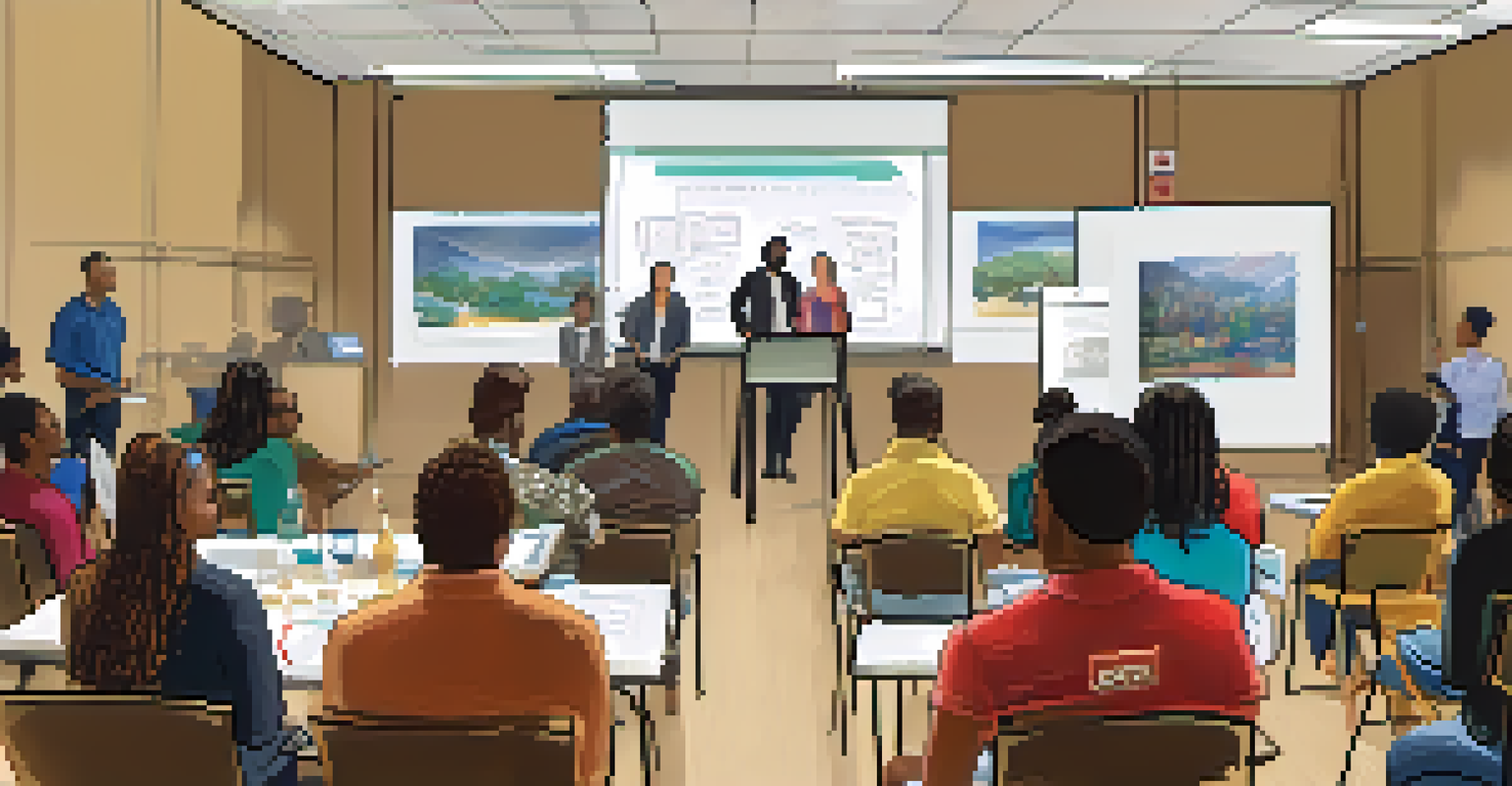Equity in Career Counseling: Supporting Diverse Students

Understanding Equity in Career Counseling
Equity in career counseling means providing fair access and opportunities for all students, regardless of their background. It's about recognizing that not everyone starts from the same place and that some may face systemic barriers. By understanding these disparities, counselors can tailor their approach to meet the unique needs of diverse students.
Equity is not just about treating everyone the same, but about ensuring that everyone has what they need to succeed.
This concept goes beyond mere equality, where everyone gets the same resources. Instead, equity focuses on giving students what they specifically need to succeed, whether that involves additional support, mentorship, or resources. For instance, a first-generation college student might require different guidance than someone with a family history of higher education.
Ultimately, embracing equity in career counseling helps create a more inclusive environment where every student can thrive. By acknowledging their differences and challenges, counselors can empower students to pursue their dreams confidently.
The Role of Cultural Competence in Counseling
Cultural competence is essential for counselors to effectively support diverse students. This means understanding and appreciating different cultural backgrounds, values, and experiences. By being culturally aware, counselors can build stronger relationships and trust with their students, which is crucial for effective guidance.

For example, a counselor who understands the cultural significance of certain career paths within a community can provide more relevant advice. This tailored support not only resonates with students but also encourages them to explore options they might not have considered otherwise. It’s about connecting the dots between cultural identity and career opportunities.
Equity Enhances Career Counseling
Embracing equity allows counselors to provide tailored support, helping diverse students overcome unique barriers to success.
Additionally, cultural competence helps counselors recognize their biases and assumptions. By reflecting on their own perspectives, they can offer more equitable support and ensure that all students feel valued and respected in the career counseling process.
Identifying Barriers Facing Diverse Students
Diverse students often encounter various barriers in their career journeys, including financial constraints, lack of access to networks, and limited exposure to career options. Recognizing these obstacles is the first step in providing effective support. Counselors must actively listen to their students’ experiences to understand the unique challenges they face.
Cultural competence is a critical foundation for effective counseling, allowing for understanding and respect of diverse backgrounds.
For instance, students from low-income backgrounds may struggle with job internships that require unpaid work, which can limit their opportunities. By identifying these barriers, counselors can advocate for more inclusive programs that offer paid internships or scholarships specifically designed for underrepresented groups.
Moreover, awareness of these challenges enables counselors to connect students with resources and support systems that can help them navigate their career paths. Whether it's mentorship programs or workshops, targeted interventions can make a significant difference in leveling the playing field.
Tailoring Career Counseling Approaches
To effectively support diverse students, career counseling approaches must be tailored to individual needs. This personalized method involves assessing each student's background, interests, and goals. By taking the time to understand these factors, counselors can provide more relevant and impactful guidance.
For example, a student interested in a STEM career might benefit from connections to industry professionals who share similar backgrounds. Counselors can facilitate these connections, helping students build networks that can lead to internships and job opportunities. This targeted approach can inspire confidence and open doors.
Cultural Competence Builds Trust
Culturally aware counselors can connect more effectively with students, fostering stronger relationships that enhance guidance.
Additionally, incorporating various counseling methods, such as group sessions or one-on-one meetings, can cater to different learning styles and preferences. By diversifying their approach, counselors can ensure that every student feels supported and engaged in their career exploration.
Building Inclusive Career Resources
Creating inclusive career resources is crucial for supporting diverse students. This means developing materials that reflect a variety of backgrounds and experiences. Resources should highlight success stories from diverse professionals and include information on navigating challenges specific to underrepresented groups.
For instance, career workshops can incorporate speakers from various industries who share their journeys and insights. This not only provides inspiration but also helps students envision their own future paths. When students see role models who look like them, it enhances their sense of belonging and motivation.
Furthermore, resources should be easily accessible, considering factors like language barriers and technology access. By making information available in multiple formats and languages, counselors can ensure that all students have the opportunity to benefit from valuable career guidance.
Fostering Partnerships with Community Organizations
Partnerships with community organizations can significantly enhance career counseling for diverse students. These organizations often have established relationships within the community and can provide valuable resources and support. By collaborating, counselors can tap into a wealth of knowledge and connections that benefit their students.
For example, local nonprofits focused on youth development may offer mentorship programs or workshops tailored to specific populations. By directing students to these resources, counselors can help them gain practical skills and insights that complement their academic experiences. This holistic approach can be transformative.
Partnerships Expand Resources
Collaborating with community organizations enriches career counseling by providing additional resources and mentorship opportunities.
Additionally, these partnerships can help raise awareness about career opportunities in underserved communities. By working together, career counselors and community organizations can create programs that not only inform but also inspire students to pursue careers they might not have considered.
Evaluating the Impact of Equity in Counseling
Evaluating the impact of equity-focused initiatives in career counseling is essential for continuous improvement. By assessing the effectiveness of programs and strategies, counselors can identify what works and what needs adjustment. This evaluation process allows for data-driven decisions that enhance support for diverse students.
For instance, collecting feedback from students about their experiences can provide invaluable insights. Are they feeling more confident in their career choices? Have they accessed new resources successfully? By analyzing this data, counselors can refine their approaches and better meet the evolving needs of their students.

Moreover, sharing these evaluation outcomes with stakeholders, including schools and community organizations, can foster a culture of collaboration and accountability. This collective effort ensures that equity remains a priority, ultimately leading to more successful career outcomes for all students.